Masters in music are the original sound recordings that all copies, streams, and reproductions stem from.
They determine who controls the use, distribution, and profits from your music.
Owning your masters can open up more opportunities for royalty payments, licensing deals, and creative decision-making.
As an artist or producer, understanding “what are masters in music” will help you understand record deals, negotiate better terms, and protect your music from being used in ways you don’t agree with.
It’s all about making sure you’re maximizing your earnings and never losing your legal rights over your creations.
That’s why we’re breaking down everything you need to know, like:
- The basics of what are masters in music ✓
- The value of owning your masters ✓
- Current trends in master ownership ✓
- How record labels handle masters ✓
- Key strategies for negotiating master recording rights ✓
- Legal implications & copyright laws around masters ✓
- Collecting royalties ✓
- Using digital platforms to keep your master rights ✓
- Deciding if you should master your own music ✓
- Much more about what are masters in music ✓
After this article, you’ll know everything about masters in music and how to protect and maximize the value of your work.
This way, you can negotiate with confidence, plan your career like a boss, and make sure your music is always in your hands, both creatively and legally.
So, let’s dive in…
Table of Contents
What Are Masters in Music?
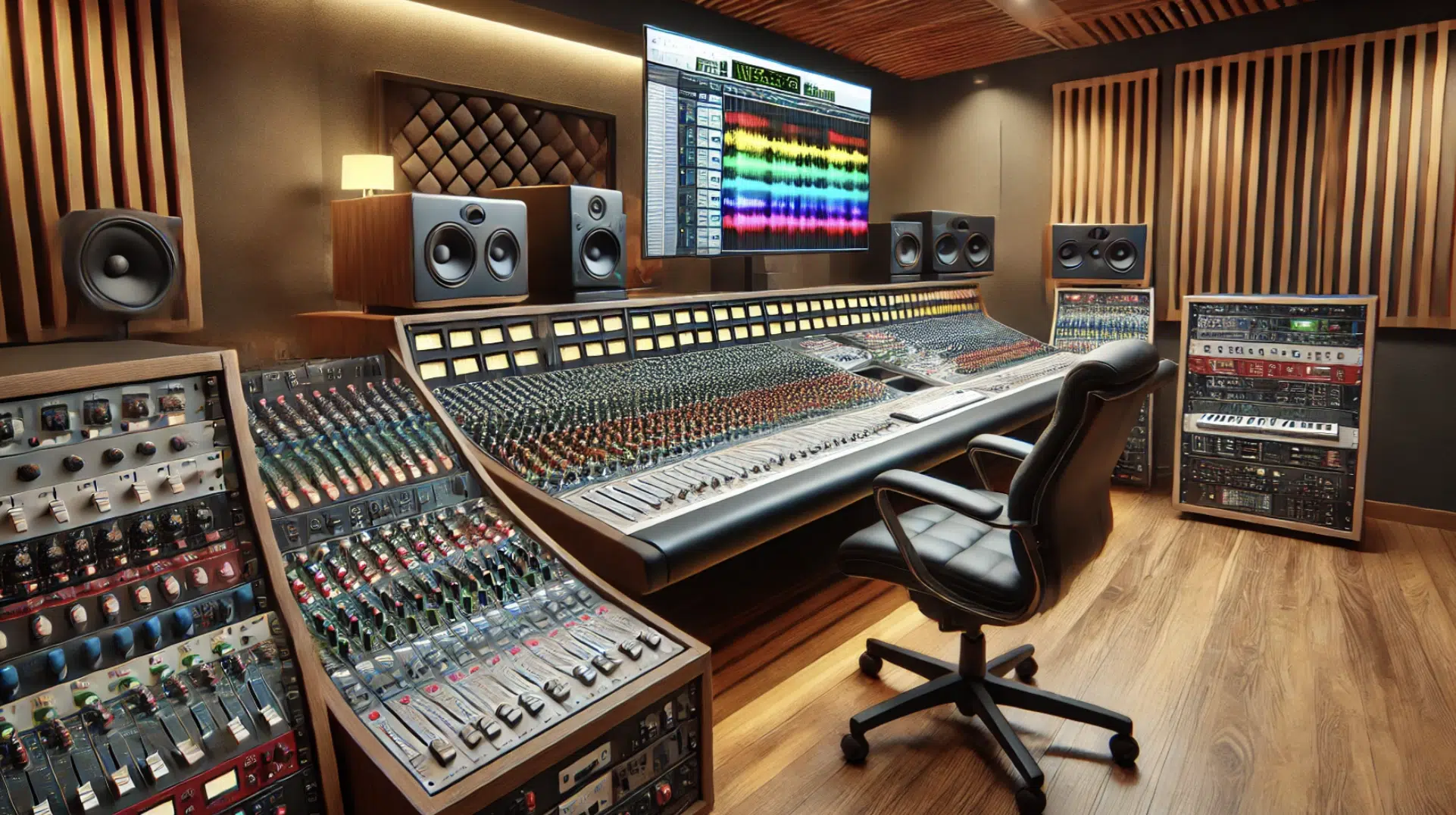
If you’re asking yourself, “What are masters in music?” you’re diving into one of the most key aspects of the music industry, hands down.
A master recording is the original sound recording of a particular song, from which all copies, like CDs, vinyl, and digital streams, are made.
When an artist owns their masters, they control how their music is:
- Used
- Distributed
- Monetized
However, in many cases, a record label typically owns these master recordings due to the structure of record deals.
Knowing who holds the master rights is essential because it determines who collects royalty payments from all the recorded music.
And, how much control the artist has over their music career.
So, now that you have a basic understanding of what are masters in music, let’s really break down the details.
The Value of Owning Your Masters
Owning your masters means having full control over your music. Let’s start by covering why this is a game-changer in terms of creative control and financial gain for artists.
-
Creative and Financial Control Over Master Recordings

When an artist owns their master recordings, they have significant creative control over how their original sound recordings are used.
This means you can decide whether your music is used in commercials, movies, or on streaming services, and can even prevent it from being used in contexts you don’t like.
For example, Taylor Swift famously fought to regain her masters to have the power to decide how her recordings are licensed, used in media, or even re-recorded.
Owning masters also means more future royalties.
Artists like Kanye West have emphasized the importance of this, arguing that record labels should not get the lion’s share of profits from sound recordings.
By owning your masters, you can negotiate licensing deals directly 一 ensuring that you get the largest possible cut from the use of their music in various media/formats (like streaming services).
NOTE: As a music producer, having the legal right to your masters not only provides a stronger financial foundation but also gives you creative control.
-
Impact on an Artist’s Legacy

Having full ownership of music masters affects more than just the artist’s current earnings 一 it shapes their long-term legacy, baby.
For example, owning the master recordings allows artists to decide how their recorded music will be used for decades, whether it’s for:
- Movie syncs
- TV shows
- Even vinyl records reissues
When an artist owns their masters, it gives them the ability to ensure that their music is not exploited or used in ways they don’t approve of (which is very important if you ask me).
This also opens the door for more personalized marketing strategies and exclusive rights deals, giving independent artists a serious leg up.
For up-and-coming artists, owning new masters could mean greater control over their careers without being tied to restrictive recording contracts.
Current Trends in Master Ownership (2024)
In 2024, the dynamics around master recordings have changed significantly in the music industry. More artists and music producers are exploring ways to retain ownership of their music masters, which is reshaping how record labels approach recording contracts. Let’s break it down.
-
The Shift Toward Independent Ownership
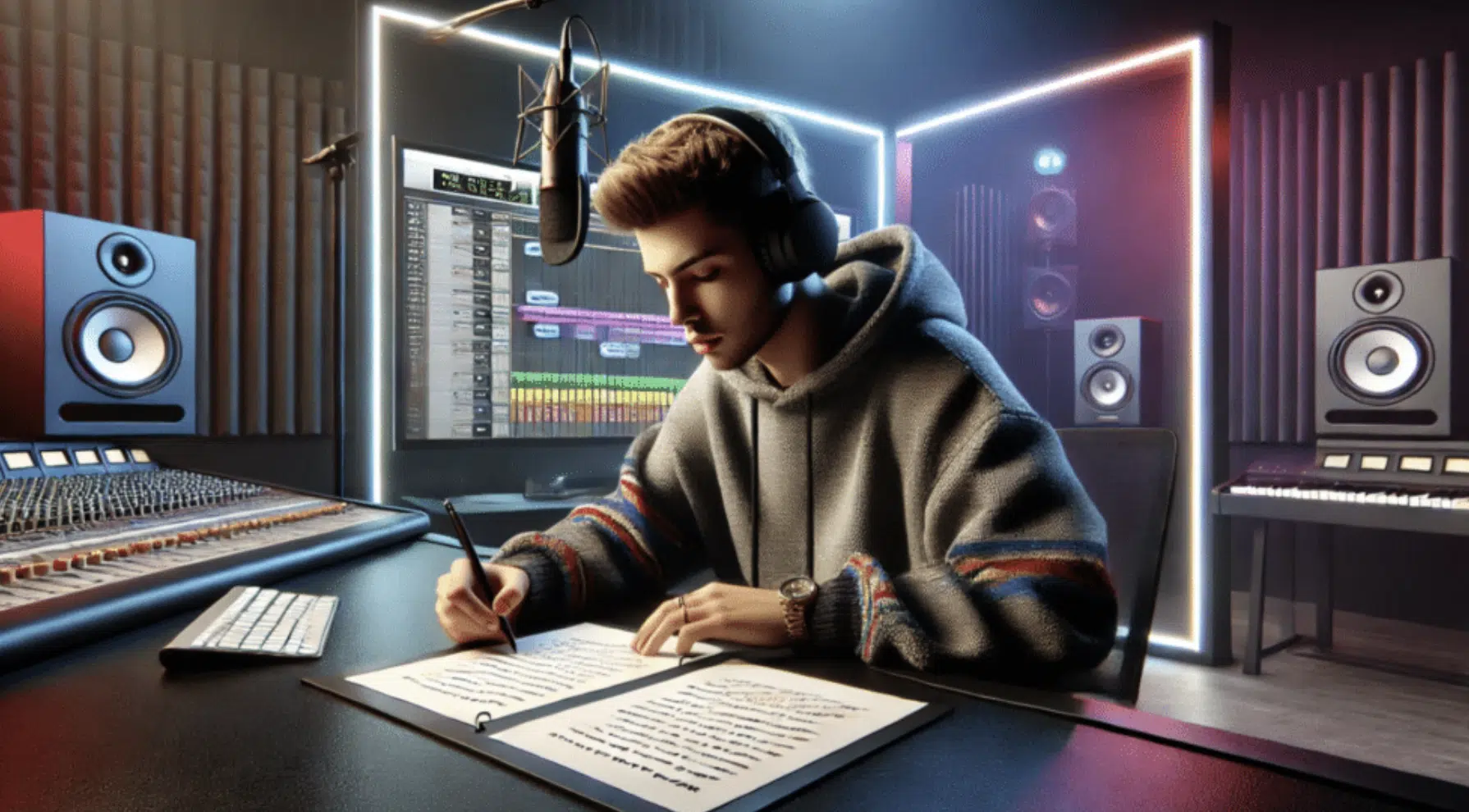
A major trend is the shift toward independent artists retaining master rights instead of signing away their original sound recordings to record labels.
Artists like Frank Ocean and Chance the Rapper have demonstrated the power of going independent and keeping their master recordings.
By choosing this path, you can maximize your earnings from streaming, sync licensing, and vinyl records sales while maintaining creative control over their sound recordings.
This trend has gained some serious traction as many artists become more aware of the benefits of owning your masters, like having the legal power to make decisions on how their music is marketed and distributed.
As a result, other artists are increasingly looking at non-traditional routes 一 bypassing major record companies to avoid losing ownership of their music masters.
Having control means you’re not bound by a record label’s timeline or strategy, which might not align with your personal vision.
The benefit? You get to capitalize on your own momentum and maximize your presence when it suits you best.
Believe it or not, this was not a thing until recently… Shocking, I know.
Yes, it means more responsibility (handling marketing, distribution, and even recording costs yourself), but you get to make all the decisions, so it’s up to you.
-
Record Labels Re-evaluating Contract Terms

With the rise of independent ownership, major record labels like Universal Music Group are re-evaluating their contract terms to stay competitive.
There has been a huge shift toward more artist-friendly recording contracts, where the label owns the masters for a limited period before they revert back to the artist.
This gives artists a window to regain control over their master recordings while still benefiting from the resources and promotion that a record label can provide.
However, with social media, if you know what you’re doing, you can certainly get enough exposure yourself (but it’s an all day thing, so it does come in handy).
By incorporating reversion clauses into contractual agreements, record labels hope to attract up-and-coming artists who are wary of losing their masters rights for a set period.
This helps bridge the gap between the traditional deals that dominated the music business and the more flexible agreements needed to thrive in the digital age.
How Record Labels Typically Handle Masters
Understanding how record labels typically handle masters can help you make the right decisions about any future record deals. Here’s a closer look at the types of contracts record labels offer and what you need to know to protect your master recording rights. I mean, your own songs are just that: your own. So, you really need to know everything about this kind of stuff before diving in.
-
Traditional Record Label Contracts

In most traditional deals, the record label finances the recording costs and in exchange, it takes ownership of the master recordings.
Super straightforward, right? Well… kind of.
This means the label owns the original recording and has the legal rights to control how the sound recordings are used and distributed.
For many artists, especially those new to the music industry, this trade-off might seem necessary to cover recording costs and gain access to the label’s marketing resources.
However, it often means that the artist receives only a small percentage of the revenue generated from recorded music, such as mechanical royalties, performance royalties, and streams on Apple Music.
While this can lead to a huge amount of exposure, you might eventually realize they’ve given up too much control over your masters and future earnings.
-
360 Deals and the New Age of Contracts
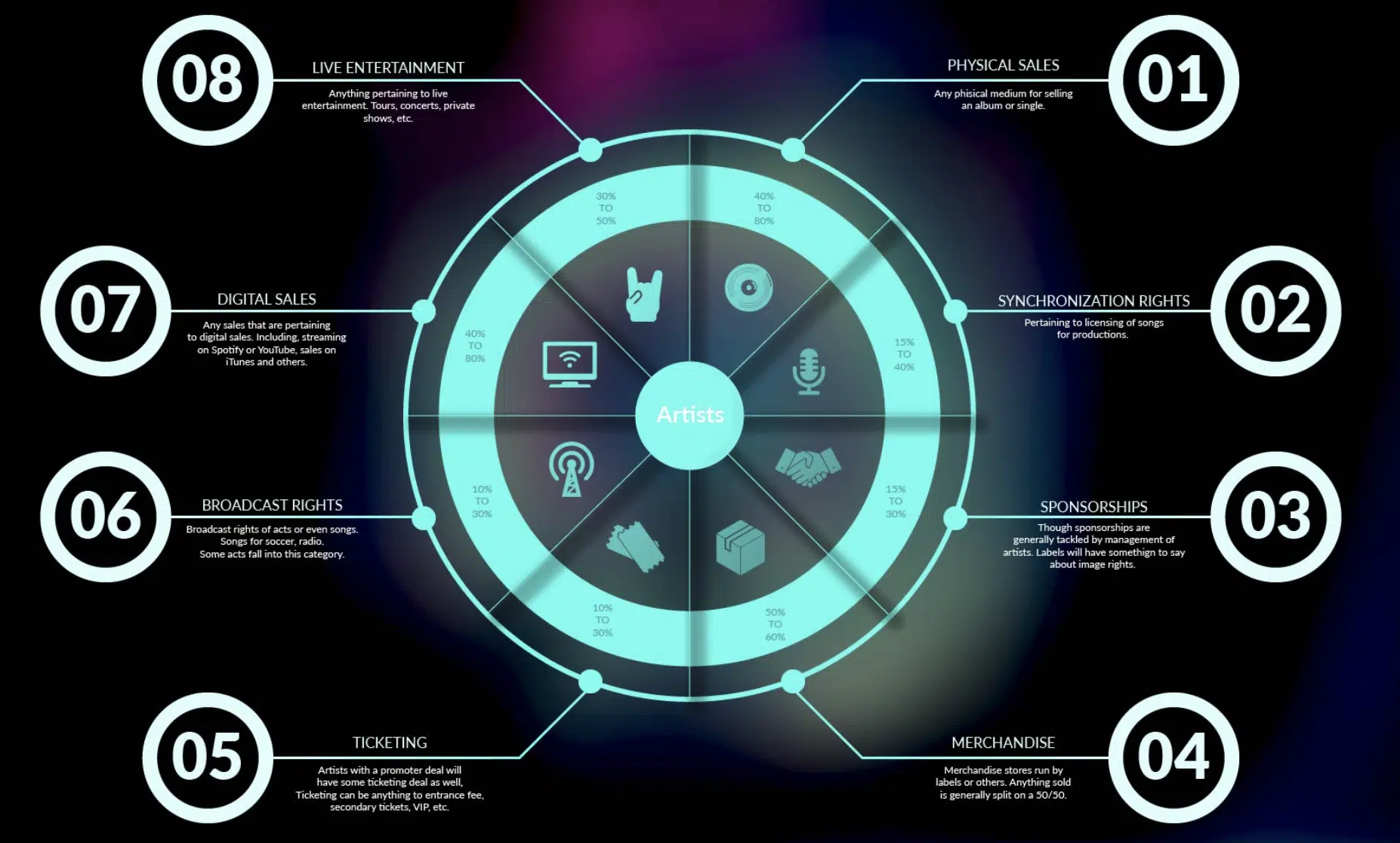
The introduction of 360 deals changed how record labels operate, allowing them to earn from multiple revenue streams beyond sound recordings, like:
- Touring
- Merchandise
- Endorsements
In exchange, some 360 deals allow artists to retain partial ownership of their master recordings or gain a more favorable (aka fair) revenue split.
It’s perfect for up-and-coming artists who might not have the resources to go fully independent but still want a better deal than a traditional record deal.
However, the downside is that artists must carefully negotiate these agreements to avoid ending up in unfavorable artist contracts that provide the record label/recording studio with the majority of master rights.
Learning to manipulate these deals and leverage the opportunity to keep a portion of their masters can be a game-changer for any music producer or artist.
-
Key Strategies for Negotiating Ownership Over Your Master Recordings
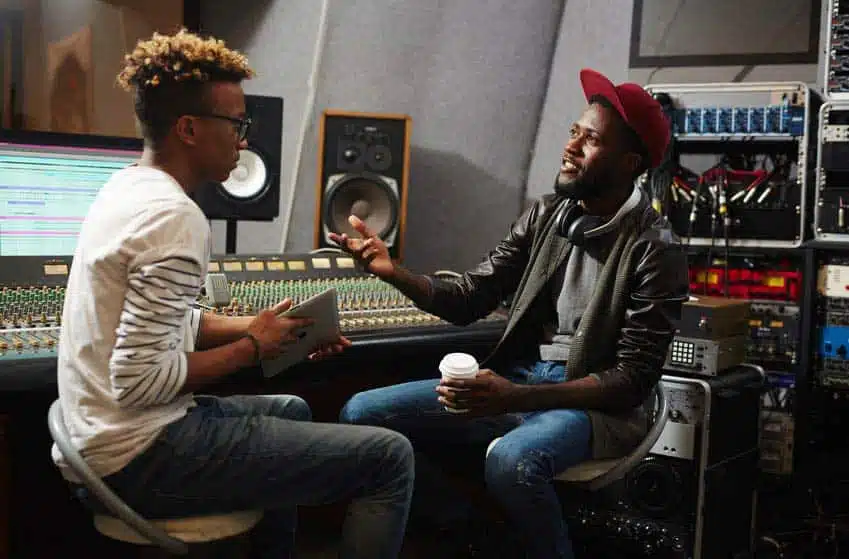
To negotiate the best terms for master ownership, you should focus on:
- Securing either a limited period where the label owns the masters.
- Full ownership after recoupment of recording costs.
It’s super important to outline these details clearly in the record deal to avoid ambiguity.
Also, negotiating for a higher royalty rate (especially from streaming services) can make a huge difference in an artist’s revenue over time.
You should also consider bringing in experienced legal counsel to help negotiate master recording rights and publishing rights.
It just ensures all intellectual property rights are actually retained.
By being proactive and informed, artists can avoid the pitfalls of traditional deals and gain more control over their careers.
-
Understanding Reversion Clauses and Exit Strategies
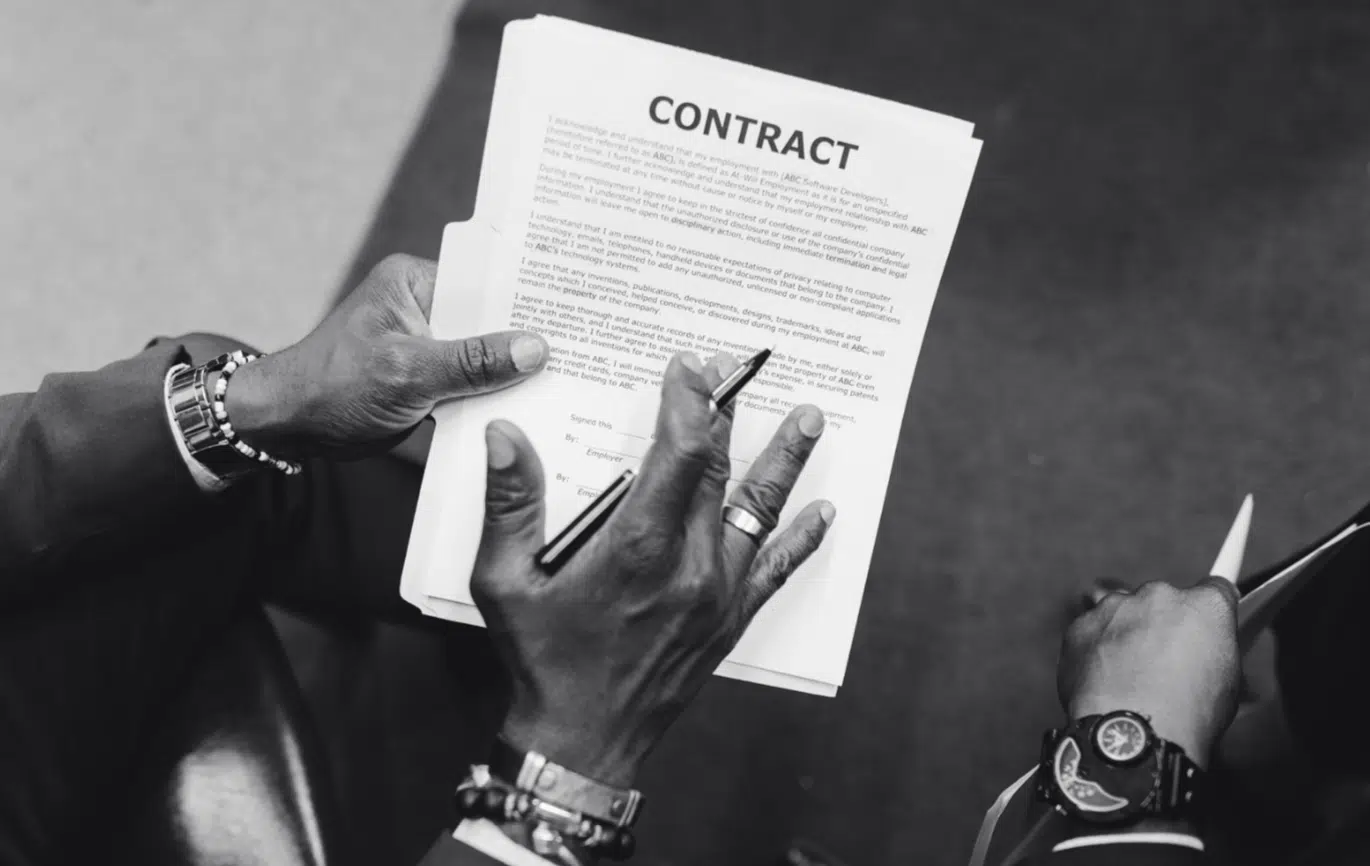
When it comes to negotiating with a record label, a reversion clause is one of the most powerful tools you could have in your arsenal.
This clause says that after a given period, the master owns the rights revert back to the artist 一 allowing them to regain full control over their music.
Without it, you could be signing away your original recordings forever, with no chance to regain full control over your music.
For example, a clause might state that after 10 years or after the record label has recouped all recording costs, the artist gets their masters back.
Understanding how to effectively negotiate these terms is essential…
It can mean the difference between lifelong publishing rights to your music masters and being locked into a contractual agreement indefinitely.
NOTE: A well-negotiated reversion clause can also protect against the risks of a record deal going sour. If a record label isn’t promoting your music effectively or you’re unhappy with the direction they are taking your brand, having that reversion in place means you won’t be stuck in a bad situation forever.
Another important one is an exit strategy, such as re-recording your original recording after a set period (like Taylor Swift did), can also provide leverage and open up new income streams.
By offering a refreshed version of your music/beats, you provide fans with an alternative that directly benefits you, not the record label.
This tactic can pressure labels to offer better terms upfront 一 knowing that you have the leverage to protect your masters (it’s super bold, but sometimes necessary).
With the right approach, artists can balance the benefits of working with a record label while still securing their long-term interests.
Legal and Copyright Implications
Now let’s get a little deeper into the legal side of master recordings. Knowing how to protect your own masters and understanding the legal framework around them can make a super big difference in your music career.

Copyright ownership plays a critical role in how artists control their music and its distribution.
When recording music, the master recording is considered the intellectual property of whoever financed the project; aka the record label.
This means the label has the legal right to decide where and how the recordings are used, whether in streaming services, ads, films, or commercials.
On the other hand, publishing rights are tied to the composition itself, meaning the lyrics and melody.
These rights determine who gets paid when a song is:
- Performed
- Streamed
- Sold
If you’re not careful, you could sign away both 一 leaving you with little control or revenue from your sound recordings.
For an artist, securing legal rights over their original recordings requires careful negotiation and often means hiring a legal expert who understands the music business.
Without this stuff you can risk losing not only royalty payments but also creative control over your work.
Side note, registering your music can help you secure statutory damages if your rights are infringed upon or anything goes sideways.
NOTE: Be aware of the term “work for hire,” a concept in copyright law where the entity that commissions the work (often a record label) owns the copyright from the start.
Many record deals may try to classify your work this way, meaning you wouldn’t own your masters or even have a claim to the copyright of your recorded music.
Screw that, am I right?
-
Direct-to-Fan Distribution Models

Direct-to-fan models allow independent artists like yourself to bypass record labels entirely, maintaining master recording rights and keeping a larger share of earnings.
Platforms like Bandcamp and Patreon help artists sell original sound recordings directly to fans, offering:
- Exclusive content
- Physical copies like vinyl records
- Early releases
With it, you can monetize your sound recordings without sacrificing masters rights to a record label, which is great.
By taking advantage of these platforms, artists can also build stronger fan relationships, which can be everything when it comes to maximizing royalty payments from streaming services like Apple Music.
NOTE: For many music producers, this offers a solid way to thrive in the music industry without relying on a record company to distribute their music.
-
Social Media/Streaming Services as a Leverage Tool

Social media platforms like Instagram, Twitter, and TikTok have given artists insane reach and influence, which can be used to negotiate better record deals.
An artist signs with a strong social media following can leverage that visibility to demand more favorable terms in their recording contracts.
This of course includes a fairer split on masters rights and certain other perks.
Streaming services like Apple Music and Spotify also play a crucial role in this dynamic, as they offer data that artists can use to prove their market value to record labels.
With millions of streams and a loyal fanbase, artists gain the upper hand in ensuring that they don’t end up in a traditional record deal where they lose control of their music masters.
For independent artists, this leverage is super important in creating a sustainable career while keeping their publishing rights intact.
What are Masters in Music: Final Thoughts
Mastering the concept of “what are masters in music” (no pun intended) is key for every artist and producer who wants to take control of their music and career, period.
As you now know, masters in music represent the original recordings, and owning them can mean the difference between having full creative control and long-term financial benefits, or being bound by a record label’s terms indefinitely.
When you understand “what are masters in music,” you can make deals better, protect your rights, and ensure that your recordings are used in ways you approve of.
Plus, benefit fully from your music’s success in licensing, streaming, and sales.
On that note, one of the best ways to maintain complete ownership of your work from the start is to use royalty-free resources like the best Free Sample Packs in the game.
These packs are all packed with provide high-quality, ready-to-use samples, loops, and MIDI files that are 100% royalty-free.
This means you can create and release professional-grade tracks without worrying about hidden costs or losing rights to your music masters.
It’ll help you elevate your production game while keeping full control of your creations; nothing better than that.
So, by understanding “what are masters in music” and how to manipulate ownership, you’re setting yourself up for a long-lasting, profitable music career.
It’s about making smart, informed choices now to make sure your music stays yours, both creatively and legally, in the years to come.
Until next time…






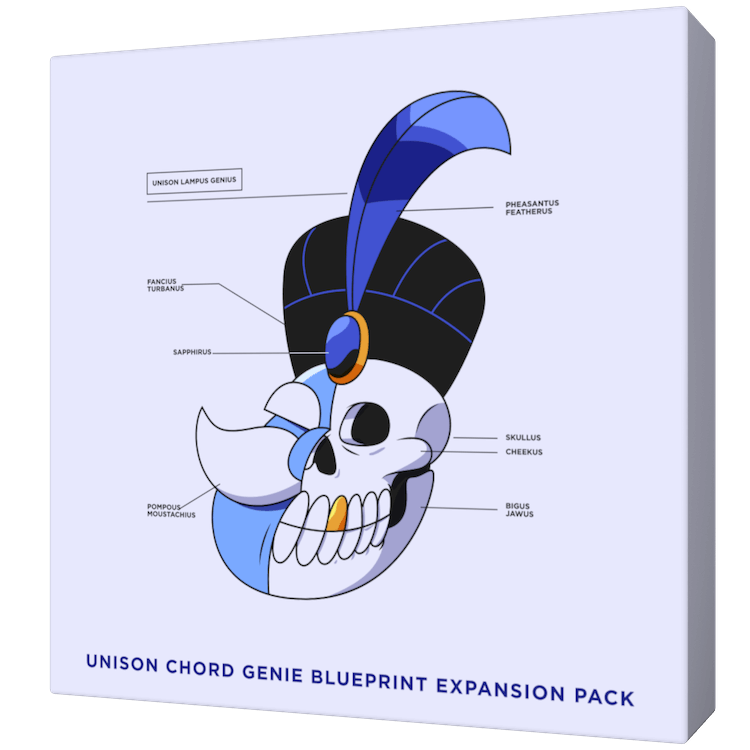
Leave a Reply
You must belogged in to post a comment.